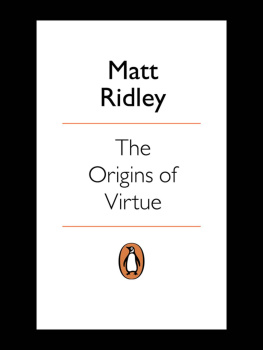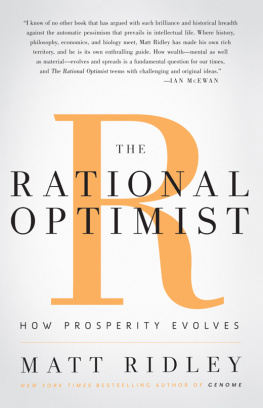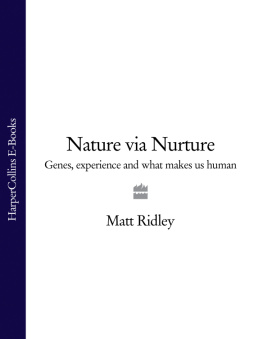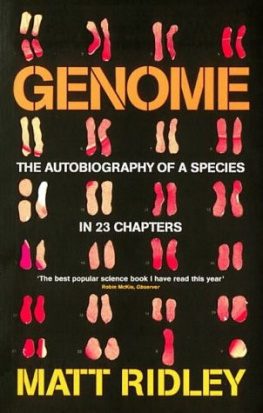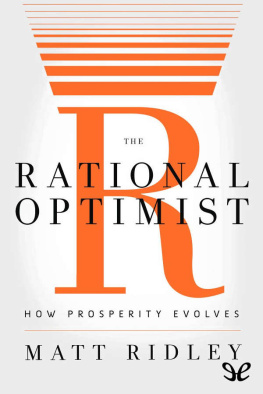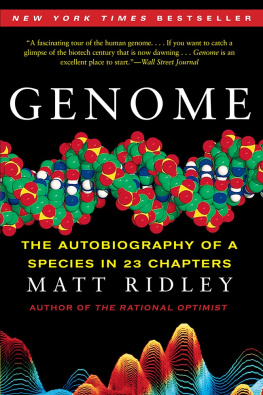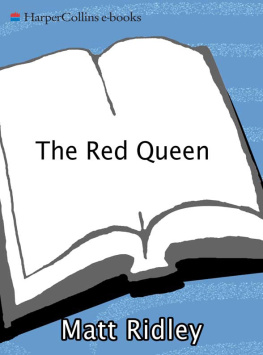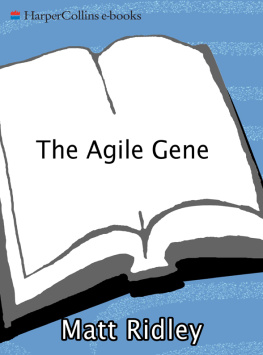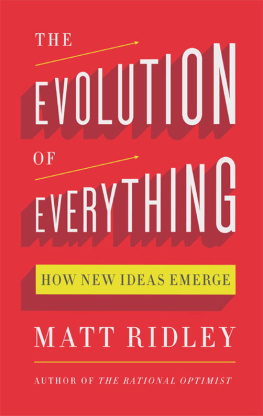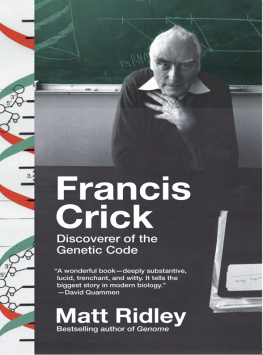Genome - Matt Ridley
Here you can read online Genome - Matt Ridley full text of the book (entire story) in english for free. Download pdf and epub, get meaning, cover and reviews about this ebook. genre: History. Description of the work, (preface) as well as reviews are available. Best literature library LitArk.com created for fans of good reading and offers a wide selection of genres:
Romance novel
Science fiction
Adventure
Detective
Science
History
Home and family
Prose
Art
Politics
Computer
Non-fiction
Religion
Business
Children
Humor
Choose a favorite category and find really read worthwhile books. Enjoy immersion in the world of imagination, feel the emotions of the characters or learn something new for yourself, make an fascinating discovery.

Matt Ridley: summary, description and annotation
We offer to read an annotation, description, summary or preface (depends on what the author of the book "Matt Ridley" wrote himself). If you haven't found the necessary information about the book — write in the comments, we will try to find it.
Matt Ridley — read online for free the complete book (whole text) full work
Below is the text of the book, divided by pages. System saving the place of the last page read, allows you to conveniently read the book "Matt Ridley" online for free, without having to search again every time where you left off. Put a bookmark, and you can go to the page where you finished reading at any time.
Font size:
Interval:
Bookmark:

The author is grateful to the following publishers for permission to reprint brief extracts: Harvard University Press for four extracts from Nancy Wexler's article in The Code of Codes, edited by D. Kevles and R. Hood (pp. 62-9); Aurum Press for an extract from The GeneHunters by William Cookson (p. 78); Macmillan Press for extracts from Philosophical Essays by A. J. Ayer (p. 338) and What Remains to BeDiscovered by J. Maddox (p. 194); W. H. Freeman for extracts from The Narrow Roads of Gene Land by W. D. Hamilton (p. 131); Oxford University Press for extracts from The Selfish Gene by Richard Dawkins (p. 122) and Fatal Protein by Rosalind Ridley and Harry Baker (p. 285); Weidenfeld and Nicolson for an extract from One Renegade Cell by Robert Weinberg (p. 237). The author has made every effort to obtain permission for all other extracts from published work reprinted in this book.
This book was originally published in Great Britain in 1999 by Fourth Estate Limited.
GENOME. Copyright 1999 by Matt Ridley. All rights reserved. Printed in the United States of America. No part of this book may be used or reproduced in any manner whatsoever without written permission except in the case of brief quotations embodied in critical articles and reviews. For information address HarperCollins Publishers, Inc., 10
East 53rd Street, New York, NY 10022.
HarperCollins books may be purchased for educational, business, or sales promotional use. For information please write: Special Markets Department, HarperCollins Publishers, Inc., 10 East 53rd Street, New York, NY 10022.
FIRST U.S. EDITION
Library of Congress Cataloging-in-Publication Data Ridley, Matt
Genome: the autobiography of a species in 23 chapters/Matt Ridley.
p. cm.
Includes bibliographical references and index.
ISBN 0-06-019497-9
1. Human genome Popular works. 2. Human genetics Popular works. I. Title.
QH431.R475 2000
599.93'5dc21 99-40933
00 01 02 03 04 RRD 10 9 8 7 6 5 4 3 2 1
C O N T E N T S
Acknowledgements l
Preface 3
1 Life 11
2 Species 23
3 History 38
4 Fate 54
5 Environment 65
6 Intelligence 76
7 Instinct 91
X and Y Conflict 107
8 Self-interest 122
9 Disease 136
10 Stress 147
11 Personality 161
12 Self-Assembly 173
13 Pre-History 185
14 Immortality 195
15 Sex 206
16 Memory 219
17 Death 231
18 Cures 243
19 Prevention 258
20 Politics 271
21 Eugenics 286
22 Free Will 301
Bibliography and Notes 314
Index 337
A L S O B Y M A T T R I D L E Y
The Red Queen: Sex and the Evolution of Human Nature
The Origins of Virtue:
Human Instincts and the Evolution of CooperationA
C
K
N
O
W
L
E
D
G
E
M
E
N
T
S
In writing this book, I have disturbed, interrupted, interrogated, emailed and corresponded with a great variety of people, yet I have never once met anything but patience and politeness. I cannot thank everybody by name, but I would like to record my great debts of gratitude to the following: Bill Amos, Rosalind Arden, Christopher Badcock, Rosa Beddington, David Bendey, Ray Blanchard, Sam Brittan, John Burn, Francis Crick, Gerhard Cristofori, Paul Davies, Barry Dickson, Richard Durbin, Jim Edwardson, Myrna Gopnik, Anthony Gottlieb, Dean Hamer, Nick Hastie, Brett Holland, Tony Ingram, Mary James, Harmke Kamminga, Terence Kealey, Arnold Levine, Colin Merritt, Geoffrey Miller, Graeme Mitchison, Anders Moller, Oliver Morton, Kim Nasmyth, Sasha Norris, Mark Pagel, Rose Paterson, David Penny, Marion Petrie, Steven Pinker, Robert Plomin, Anthony Poole, Christine Rees, Janet Rossant, Mark Ridley, Robert Sapolsky, Tom Shakespeare, Ancino Silva, Lee Silver, Tom Strachan, John Sulston, Tim Tully, Thomas Vogt, Jim Watson, Eric Wieschaus and Ian Wilmut.
Special thanks to all my colleagues at the International Centre for Life, where we have been trying to bring the genome to life. Without the day-to-day interest and support from them in matters biological 2 G E N O M E
and genetic, I doubt I could have written this book. They are Alastair Balls, John Burn, Linda Conlon, Ian Fells, Irene Nyguist, Neil Sulli-van, Elspeth Wills and many others.
Parts of two chapters first appeared in newspaper columns and magazine articles. I am grateful to Charles Moore of the Daily Telegraph and David Goodhart of Prospect for publishing them.
My agent, Felicity Bryan, has been enthusiasm personified throughout. Three editors had more faith in this book when it was just a proposal than (I now admit) I did: Christopher Potter, Marion Manneker and Maarten Carbo.
But to one person I give deeper and more heartfelt gratitude than to all the rest put together: my wife, Anya Hurlbert.
P R E F A C E
The human genome the complete set of human genes - comes packaged in twenty-three separate pairs of chromosomes. Of these, twenty-two pairs are numbered in approximate order of size, from the largest (number 1) to the smallest (number 22), while the remaining pair consists of the sex chromosomes: two large X chromosomes in women, one X and one small Y in men. In size, the X comes between chromosomes 7 and 8, whereas the Y is the smallest.
The number 23 is of no significance. Many species, including our closest relatives among the apes, have more chromosomes, and many have fewer. Nor do genes of similar function and type necessarily cluster on the same chromosome. So a few years ago, leaning over a lap-top computer talking to David Haig, an evolutionary biologist, I was slightly startled to hear him say that chromosome 19 was his favourite chromosome. It has all sorts of mischievous genes on it, he explained. I had never thought of chromosomes as having personalities before. They are, after all, merely arbitrary collections of genes. But Haig's chance remark planted an idea in my head and I could not get it out. Why not try to tell the unfolding story of the human genome, now being discovered in detail for the first time, chromosome by chromosome, by picking a gene from 4 G E N O M E
each chromosome to fit the story as it is told? Primo Levi did something similar with the periodic table of the elements in his autobiographical short stories. He related each chapter of his life to an element, one that he had had some contact with during the period he was describing.
I began to think about the human genome as a sort of autobiography in its own right a record, written in 'genetish', of all the vicissitudes and inventions that had characterised the history of our species and its ancestors since the very dawn of life. There are genes that have not changed much since the very first single-celled creatures populated the primeval ooze. There are genes that were developed when our ancestors were worm-like. There are genes that must have first appeared when our ancestors were fish. There are genes that exist in their present form only because of recent epidemics of disease. And there are genes that can be used to write the history of human migrations in the last few thousand years.
From four billion years ago to just a few hundred years ago, the genome has been a sort of autobiography for our species, recording the important events as they occurred.
Next pageFont size:
Interval:
Bookmark:
Similar books «Matt Ridley»
Look at similar books to Matt Ridley. We have selected literature similar in name and meaning in the hope of providing readers with more options to find new, interesting, not yet read works.
Discussion, reviews of the book Matt Ridley and just readers' own opinions. Leave your comments, write what you think about the work, its meaning or the main characters. Specify what exactly you liked and what you didn't like, and why you think so.

